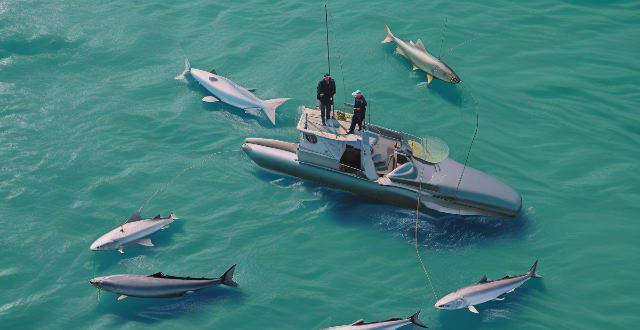The interconnected issues of climate change and fisheries conservation are addressed through various international agreements and policies. The UNFCCC aims to stabilize greenhouse gas concentrations, indirectly supporting fisheries conservation. UNCLOS provides a legal framework for ocean governance and resource management, promoting cooperation in managing fish stocks. The CBD focuses on biodiversity conservation and sustainable use of resources, acknowledging the impacts of climate change on ecosystems vital for fisheries. RFMOs manage fisheries in specific regions, incorporating climate change considerations into their strategies. National policies integrate climate action with fisheries conservation measures. Together, these frameworks work towards sustainable management of climate change and fisheries conservation.

International Agreements and Policies Addressing the Interplay between Climate Change and Fisheries Conservation
Climate change and fisheries conservation are interconnected issues that require a global approach to manage sustainably. There are several international agreements and policies in place that address the interplay between these two critical areas.
United Nations Framework Convention on Climate Change (UNFCCC)
The UNFCCC is an international environmental treaty adopted in 1992 that aims to stabilize greenhouse gas concentrations in the atmosphere at a level that would prevent dangerous anthropogenic interference with the climate system. Although it does not specifically mention fisheries, its objectives have implications for fisheries conservation as climate change affects ocean temperatures, acidity levels, and weather patterns, all of which can impact fish populations and their habitats.
Key Points:
- Objective: To stabilize greenhouse gas concentrations and prevent dangerous climate change.
- Implications: Indirectly supports fisheries conservation by addressing climate change factors affecting marine ecosystems.
United Nations Convention on the Law of the Sea (UNCLOS)
The UNCLOS, established in 1982, sets out the legal framework for the world's oceans and their resources. It includes provisions related to the conservation and management of living marine resources, including fish stocks. While not directly addressing climate change, UNCLOS provides a foundation for countries to cooperate in managing shared fish stocks and protecting marine ecosystems from overfishing and other threats.
Key Points:
- Scope: Legal framework for ocean governance and resource management.
- Relevance: Promotes cooperation in managing fish stocks and conserving marine ecosystems affected by climate change.
Convention on Biological Diversity (CBD)
The CBD, signed in 1992, is dedicated to conserving biological diversity, promoting sustainable use of natural resources, and ensuring equitable sharing of benefits from genetic resources. The CBD recognizes the importance of maintaining healthy ecosystems, including marine systems, which are essential for fisheries conservation. It also addresses the impacts of climate change on biodiversity.
Key Points:
- Focus: Biodiversity conservation and sustainable use of natural resources.
- Connection: Acknowledges the role of climate change in affecting biodiversity and ecosystems vital for fisheries.
Regional Fisheries Management Organizations (RFMOs)
RFMOs are international bodies responsible for managing fisheries in specific regions or oceans. Many RFMOs have incorporated climate change considerations into their management strategies, recognizing the need to adapt to changing ocean conditions and protect vulnerable fish stocks. Examples include the North East Atlantic Fisheries Commission (NEAFC) and the Commission for the Conservation of Antarctic Marine Living Resources (CCAMLR).
Key Points:
- Role: Regional management of fisheries resources.
- Adaptation: Incorporating climate change considerations into fisheries management strategies.
National Policies and Legislation
Many countries have implemented national policies and legislation aimed at addressing both climate change mitigation and adaptation measures, as well as fisheries conservation efforts. These policies often involve reducing greenhouse gas emissions, protecting marine habitats, and implementing sustainable fishing practices.
Key Points:
- Variety: A range of policies tailored to specific national contexts.
- Integration: Combining climate action with fisheries conservation measures.
In conclusion, while there is no single international agreement solely dedicated to the interplay between climate change and fisheries conservation, several existing frameworks and organizations work together to address this complex issue. Efforts span global treaties like the UNFCCC and CBD, regional bodies such as RFMOs, and national policies aimed at integrating climate action with fisheries management.